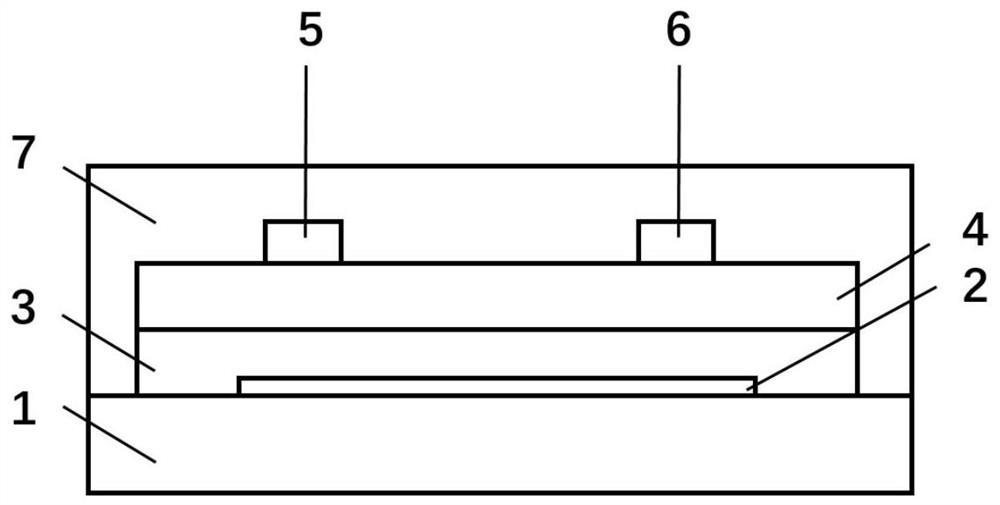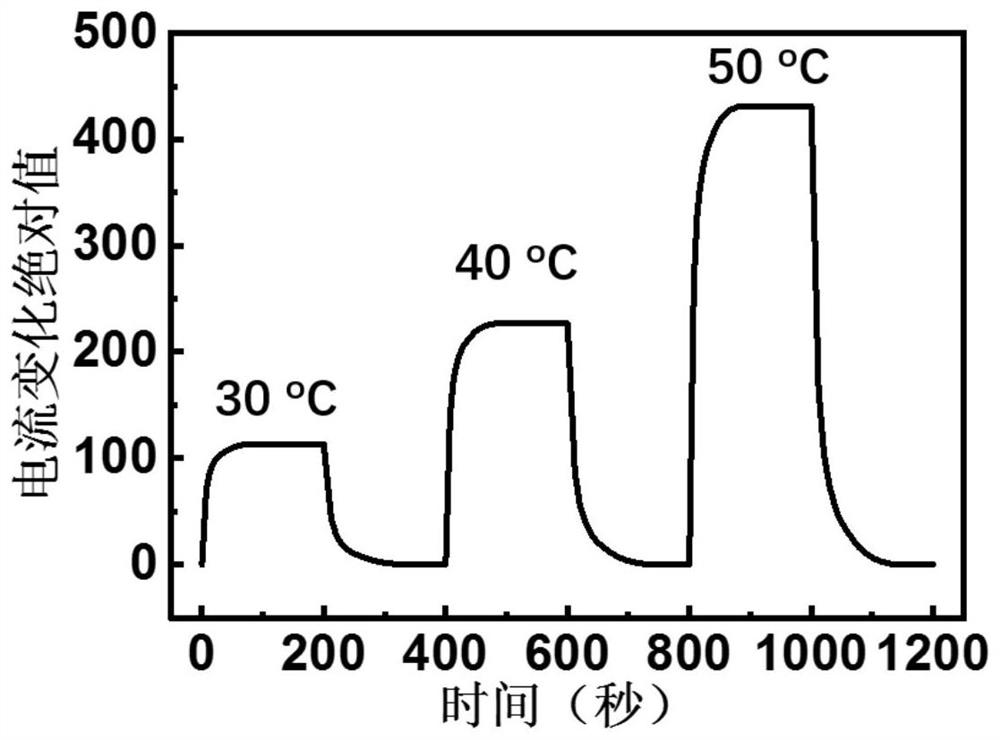A temperature sensor based on an organic field effect tube and its preparation method
A temperature sensor, organic field technology, applied in thermometers, semiconductor/solid-state device manufacturing, thermometers with electrical/magnetic components directly sensitive to heat, etc., can solve the problem of low mobility and unsatisfactory stability of biosemiconductor materials and other problems, to achieve the effect of improving the temperature sensing response, rich content and easy induction
- Summary
- Abstract
- Description
- Claims
- Application Information
AI Technical Summary
Problems solved by technology
Method used
Image
Examples
Embodiment 1
[0036] Such as figure 1 As shown, a temperature sensor based on an organic field effect tube is a bottom-gate top-contact structure, and the materials and thicknesses of each layer are: the gate electrode 2, the source electrode 5 and the drain electrode 6 are all silver nanowires, and the biodielectric layer 3 It is gelatin with a thickness of 200nm. The doped semiconductor layer 4 is composed of indigo and pectin (10% by weight of pectin) with a thickness of 50nm. The shellac encapsulation layer 7 has a thickness of 300nm. A field effect transistor temperature sensor with high sensitivity and high stability can be realized by using the structure.
[0037] A temperature sensor based on an organic field effect tube is a bottom grid top contact structure, comprising the following steps:
[0038] ① Clean the substrate 1 with detergent, acetone solution, deionized water and isopropanol solution, and dry it with nitrogen after cleaning;
[0039] ②Preparing a silver nanowire grid...
Embodiment 2
[0047] Such as figure 1 As shown, a temperature sensor based on an organic field effect tube is a bottom-gate top-contact structure, and the materials and thicknesses of each layer are: the gate electrode 2, the source electrode 5 and the drain electrode 6 are all gold nanowires, and the biodielectric layer 3 It is silk protein with a thickness of 500nm. The doped semiconductor layer 4 is composed of carotene and pectin (50% by weight of pectin) and has a thickness of 70nm. The shellac encapsulation layer 7 has a thickness of 200nm. A field effect transistor temperature sensor with high sensitivity and high stability can be realized by using the structure.
[0048] A temperature sensor based on an organic field effect tube is a bottom grid top contact structure, comprising the following steps:
[0049] ① Clean the substrate 1 with detergent, acetone solution, deionized water and isopropanol solution, and dry it with nitrogen after cleaning;
[0050] ②Preparing a gold nanowir...
Embodiment 3
[0057] Such as figure 1 As shown, a temperature sensor based on an organic field effect tube is a bottom-gate top-contact structure, and the materials and thicknesses of each layer are: the gate electrode 2, the source electrode 5 and the drain electrode 6 are all indium nanowires, and the biodielectric layer 3 Mined as egg white with a thickness of 300nm, the doped semiconductor layer 4 is a mixture of indigo and pectin (15% by weight of pectin), with a thickness of 60nm, and the shellac encapsulation layer 7 has a thickness of 250nm. A field effect transistor temperature sensor with high sensitivity and high stability can be realized by using the structure.
[0058] A temperature sensor based on an organic field effect tube is a bottom grid top contact structure, comprising the following steps:
[0059] ① Clean the substrate 1 with detergent, acetone solution, deionized water and isopropanol solution, and dry it with nitrogen after cleaning;
[0060] ②Preparing a silver na...
PUM
| Property | Measurement | Unit |
|---|---|---|
| thickness | aaaaa | aaaaa |
| thickness | aaaaa | aaaaa |
| thickness | aaaaa | aaaaa |
Abstract
Description
Claims
Application Information
 Login to View More
Login to View More - R&D
- Intellectual Property
- Life Sciences
- Materials
- Tech Scout
- Unparalleled Data Quality
- Higher Quality Content
- 60% Fewer Hallucinations
Browse by: Latest US Patents, China's latest patents, Technical Efficacy Thesaurus, Application Domain, Technology Topic, Popular Technical Reports.
© 2025 PatSnap. All rights reserved.Legal|Privacy policy|Modern Slavery Act Transparency Statement|Sitemap|About US| Contact US: help@patsnap.com


